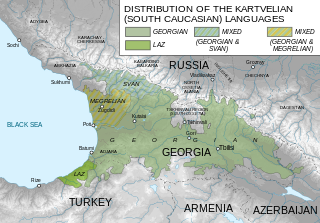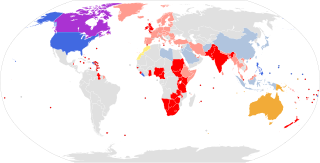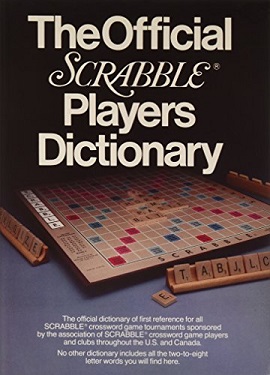Related Research Articles
The identity of the longest word in English depends on the definition of a word and of length.
The apostrophe is a punctuation mark, and sometimes a diacritical mark, in languages that use the Latin alphabet and some other alphabets. In English, the apostrophe is used for three basic purposes:

Georgian is the most widely spoken Kartvelian language; it serves as the literary language or lingua franca for speakers of related languages. It is the official language of Georgia and the native or primary language of 88% of its population. Its speakers today amount to approximately 3.8 million. Georgian is written with its own unique Georgian scripts, alphabetical systems of unclear origin.
The acute accent, ◌́, is a diacritic used in many modern written languages with alphabets based on the Latin, Cyrillic, and Greek scripts. For the most commonly encountered uses of the accent in the Latin and Greek alphabets, precomposed characters are available.

A compound is a word composed of more than one free morpheme. The English language, like many others, uses compounds frequently. English compounds may be classified in several ways, such as the word classes or the semantic relationship of their components.
Diction, in its original meaning, is a writer's or speaker's distinctive vocabulary choices and style of expression in a piece of writing such as a poem or story. In its common meaning, it is the distinctiveness of speech: the art of speaking so that each word is clearly heard and understood to its fullest complexity and extremity, and concerns pronunciation and tone, rather than word choice and style. This is more precisely and commonly expressed with the term enunciation or with its synonym, articulation.
Initial-stress derivation is a phonological process in English that moves stress to the first syllable of verbs when they are used as nouns or adjectives. This process can be found in the case of several dozen verb-noun and verb-adjective pairs and is gradually becoming more standardized in some English dialects, but it is not present in all. The list of affected words differs from area to area, and often depends on whether a word is used metaphorically or not. At least 170 verb-noun or verb-adjective pairs exist. Some examples are:

Zarma is one of the Songhay languages. It is the leading indigenous language of the southwestern lobe of the West African nation of Niger, where the Niger River flows and the capital city, Niamey, is located. Zarma is the second-most common language in the country, after Hausa, which is spoken in south-central Niger. With over 6 million speakers, Zarma is easily the most widely spoken Songhay language.

The word orange is a noun and an adjective in the English language. In both cases, it refers primarily to the orange fruit and the color orange, but has many other derivative meanings.

An acronym is an abbreviation of a phrase that usually consists of the initial letter of each word in all caps with no punctuation.
Stress is a prominent feature of the English language, both at the level of the word (lexical stress) and at the level of the phrase or sentence (prosodic stress). Absence of stress on a syllable, or on a word in some cases, is frequently associated in English with vowel reduction – many such syllables are pronounced with a centralized vowel (schwa) or with certain other vowels that are described as being "reduced". Various contradictory phonological analyses exist for these phenomena.

A word is a basic element of language that carries meaning, can be used on its own, and is uninterruptible. Despite the fact that language speakers often have an intuitive grasp of what a word is, there is no consensus among linguists on its definition and numerous attempts to find specific criteria of the concept remain controversial. Different standards have been proposed, depending on the theoretical background and descriptive context; these do not converge on a single definition. Some specific definitions of the term "word" are employed to convey its different meanings at different levels of description, for example based on phonological, grammatical or orthographic basis. Others suggest that the concept is simply a convention used in everyday situations.
The longest word in any given language depends on the word formation rules of each specific language, and on the types of words allowed for consideration.
In phonology, apocope is the loss (elision) of a word-final vowel. In a broader sense, the term can refer to the loss of any final sound from a word.

Despite the various English dialects spoken from country to country and within different regions of the same country, there are only slight regional variations in English orthography, the two most notable variations being British and American spelling. Many of the differences between American and British/English in the Commonwealth of Nations date back to a time before spelling standards were developed. For instance, some spellings seen as "American" today were once commonly used in Britain, and some spellings seen as "British" were once commonly used in the United States.
In linguistics, a monosyllable is a word or utterance of only one syllable. It is most commonly studied in the fields of phonology and morphology and it has no semantic content. The word has originated from the Greek language.

Kosraean is the language spoken on the islands of Kosrae (Kusaie), a nation-state of the Federated States of Micronesia, Caroline Islands. In 2001 there were approximately 8,000 speakers in Micronesia, and 9,060 in all countries.
The following articles list English words that share certain features in common.

The Official Scrabble Players Dictionary or OSPD is a dictionary developed for use in the game Scrabble, by speakers of American and Canadian English.
References
- 1 2 3 4 Moser, Henry M. (June 1957). Dreher, John J.; Oyer, Herbert J. (eds.). One-syllable words (Report). Technical report. Vol. 53. Columbus, Ohio: Ohio State University Research Foundation. OCLC 878346994.; cited in PMC (1978). Albert Ross Eckler (ed.). "Review: English monosyllables". Word Ways . 11–12. Indianapolis: 118.
- ↑ "Longest monosyllabic English words". Guinness World Records. Retrieved 10 February 2014.
- 1 2 Gardner, Martin (April 1979). "Mathematical games". Scientific American . 240 (4): 18. Bibcode:1979SciAm.240e..18G. doi:10.1038/scientificamerican0579-18.
- 1 2 3 Wells, John C. (2000). Longman Pronunciation Dictionary (2nd ed.). Longman. ISBN 978-0-582-36467-7.
- 1 2 Spelling: "2squirrel". Merriam-Webster Online Dictionary. Retrieved 2009-01-14.
Pronunciation: "1squirrel". Merriam-Webster Online Dictionary. Retrieved 2009-01-14. - ↑ Shaw, George Bernard (1932). Our Theatres in the Nineties. London: Constable and Company. p. 205. ISBN 1-4067-4302-X.
...horsed and broughamed, painted and decorated, furnished and upholstered...
- ↑ "schmaltz, v.". Oxford English Dictionary (2nd ed.). 1989.
- ↑ Cullen, Ruth (2006). The Little Black Book of Party Games: The Essential Guide to Throwing the Best Bashes. Illustrated by Kerren Barbas. Peter Pauper Press. p. 14. ISBN 1-59359-919-6.
If the first person has been schwartzed, he can either look at a new person and say "Zoom," or send it right back to the second person by saying "Pifigiano"
- 1 2 Webster's Third New International Dictionary . Merriam-Webster. 1966. ISBN 0-7135-1038-2.
- ↑ Joseph P. Pickett; et al., eds. (2000). "scrooch". The American Heritage Dictionary of the English Language (4th ed.). Boston: Houghton Mifflin. ISBN 0-395-82517-2. Archived from the original on 2007-08-24. Retrieved 2009-01-14.
- ↑ "strength, v.". Oxford English Dictionary (2nd ed.). 1989.
- ↑ "Scoughall". Scripture Union Holidays. 2007. Archived from the original on 2008-10-11. Retrieved 2009-01-15.
Scoughall (pronounced "skole") is in East Lothian, not far from North Berwick.
- ↑ "Do you Schweppes" (in French). Orangina Schweppes. December 2007. Archived from the original on 2007-10-31. Retrieved 2009-07-06.
- ↑ Diesenhouse, Susan (June 26, 2004). "Landscapes of the mind". Boston Globe . archinect. Retrieved 2009-01-15.
So distinctive is her style that her name has become a Euro design verb, as in Barclays at Canary Wharf is being 'Schwartzed' .
- ↑ Mandel, Roberta G. (Spring 2005). "The End of an Era at the Third District Court of Appeal: The Retirement of Judge Robert L. Shevin, Judge Mario P. Goderich and Chief Judge Alan R. Schwartz" (PDF). The Record. XI (1). Tallahassee: Florida Bar, Appellate Section: 8. Archived from the original (PDF) on 26 June 2006. Retrieved 2009-01-14.
there is no other jurist who has inspired the formation of a new terminology:"to be Schwartzed" or "to get Schwartzed" or "passing the Schwartz test."
- ↑ Barbanel, Josh (October 23, 1990). "Negotiator's Quiet Style Elicits Loud Protest". The New York Times . Retrieved 2009-01-15.
I have now turned Schmertz into a verb and a noun," the former Mayor said. "If you have been abused, we say you have been Schmertzed. If you get an unwarranted and undeserved payment from the City of New York, you say, 'Thank you Mr. Mayor, for the Schmertz.'
- ↑ Beaman, Ralph G. (1970). "Syllabilities". Word Ways (4): 79. Retrieved 23 June 2010.
- ↑ Woolbert, Charles Henry (1922). Better Speech: A Textbook of Speech Training for Secondary Schools. New York, Chicago, Harcourt, Brace and company. p. 103.
- ↑ Shoemaker, Rachel Walter Hinkle (1898). Advanced elocution. Granger Book Company. p. 129. ISBN 0-89609-169-4.